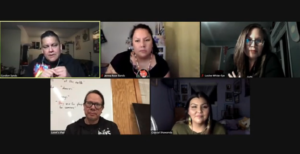Indigenous Circle Dance panel explores how learning history can help combat racism

By Colin Graf
LONDON— Educating Canadian youth about the importance of First Nations in the country’s history will help to prevent the growth of harmful stereotypes and racist attitudes. That’s the message from an Indigenous panel discussion entitled Indigenous Circle Dance featuring speakers from the London, Ont., held Apr. 29.
Both First Nations’ youth and young people of settler ancestry need to learn the stories unique to their area, and creating those lessons need to be done by Indigenous people from that region, said panellists including Leslee Whiteye, former Chief of Deshkan Ziibing (Chippewas of the Thames First Nation), currently working in Indigenous education at an inter-nation table called the First Nations with Schools Collective. The way the Antler River (Thames) that flows through London and much of southwestern Ontario is tied to the stories of Nanabush and the Great Horned Serpent “should be part of the historical story of London,” Whiteye told almost 200 viewers of the discussion, sponsored by London’s TD Sunfest music festival.
Combined with the story of the Great Migration of the Anishinabe people from the East Coast, and “the beliefs and thinkings” that they brought, there’s a lot there for students to learn about, she said. They won’t learn these local or regional stories, and the story of the Three Fires Confederacy, “if we wait for the provincial curriculum,” according to Whiteye.
“It’s really important for us as communities to pick up that work, and start to develop those resources so our own people can tell those stories,” she added.
Students are learning “about the Plains people or the Inuit as a whole,” but the local perspective is lacking, said Gordon Nicotine Sands, a fourth-generation singer of Anishinabe and Cree ancestry. There are few teaching resources about the three First Nations located next to each other to the southeast of London; Deshkan Ziibiing, Munsee Delaware, and Oneida of the Thames, according to Whiteye. The knowledge is available in oral history, land claim documents, and academic papers, she says, “but we need some help getting it out there in responsible ways. It’s really going to take some work and some partnerships.”
Informing the wider public is key to reconciliation, said panellist, singer, and double 2021 JUNO Award winner Crystal Shawanda.
“I truly believe knowledge is power. There would be more understanding if people just knew,” she said. “People just don’t realize how unjust things were when settlers came in and our culture was taken away.”
When she did her first tour of around 300 radio stations in the USA, Shawanda says she talked about residential schools, but “almost no one had any idea,” about them, she said.
“Everything from who were the original tribes in the area you are living in, to residential schools, all that education is important,” said Shawanda.
If people knew more “they would be more empathetic, they would be more understanding, and that would build a lot of bridges,” she added.
First Nations history in the London area is long and rich, said Lotunt Honyust, who has taught the Oneida language and culture since 1999. The Oneida people, members of the Haudenosaunee Confederacy, came to the area after the American Revolutionary War, from the area that became upstate New York, he told viewers. When they were forced off of their land, the Oneida were paid compensation and used that money to buy land next to reserved land for the Anishinabe and Lenape (Delaware) near London. The Oneida actually own their land collectively, so it is not a reserve, he explained.
Artist and writer Jenna Rose Sands of London, spoke about her work interpreting Indigenous history and modern issues in a series of informative ‘zines called Atrocities Against Indigenous Canadians for Dummies, designed to provide the education she says many of settler descent don’t understand. As an urban Indigenous woman, Sands says she is tired of explaining her history to people she meets, comparing it to having to explain an illness to a new doctor with every visit. Her ‘zines have dealt with topics such as residential schools, Missing and Murdered Indigenous Women, and cultural appropriation, and each deals with survivor experiences, historical facts, and questions about each topic.
It’s important to show that First Nations’ history is still important in today’s world, Sands said.
“We are living history,” she said, and even though Indigenous people are often spoken about in the past tense, she said, “we are still evolving”.
The conflict between modern life and the desire to keep tradition alive was a theme throughout the discussion.
That kind of culture shock is familiar to Crystal Shawanda, she related. Even with her success, the pull of one’s home is something Shawanda feels even after 18 years away from her childhood home on Wiikwemkoong Unceded Territory.
“That never goes away. I always feel like I’m waiting to go home.”
Homesickness can afflict many First Nations people who move from home communities to cities, Shawanda says, and the internal conflict it causes can create difficulties in charting a course through life.
“Sometimes as Indigenous, we can be a bit introverted, especially if we’re the only Indigenous person in the room, and that can affect our self-esteem and confidence. There’s always that feeling of wanting to go back to what’s comfortable for us.”
The panel discussion was preceded by performances by the Eagle Flight singers, Lotunt Honyust, and jingle dancers, and concluded with a performance by Shawanda, which included songs from her album Church House Blues, winner of the 2021 JUNO for Blues Album of the Year.

